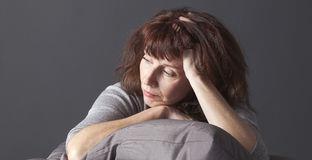Menopause is a transition period that normally happens in the life of a woman. The condition wherein the mind and body undergo rapid changes. A period that marks the beginning when the menstrual cycle ends. It starts when the monthly menstrual period ceases for uninterrupted twelve months.
Usually, menopause happens in the late 40s or early 50s. During menopause, the woman undergoes a process of hormonal changes where some discomforts are experienced. Menopausal experiences vary for each woman.

THE STAGES OF MENOPAUSE
The natural biological period of transition happens slowly over a period of time.
- The time when the menstrual cycle becomes irregular and unpredictable due to the decreasing and fluctuating level of hormones. But the menstrual period has not completely stopped. The period may last for about 3 to 5 years. Typically, a woman may enter the perimenopausal stage in their late 40s.
- On average, the woman enters the menopausal period at the age of 50s. The period when the menstrual cycle has come to complete cessation. This marks the end of reproductive life. Technically, the menopausal period happens for 12 straight months without menses.
- EARLY MENOPAUSE. Certain conditions, other than the natural process, where a sudden cessation of menses takes place due to some clinical reasons. To mention several known causes of early menopause – Premature Ovarian Failure (POF), Removal of Uterus (Hysterectomy), and/or Removal of Ovaries (Oophorectomy).
- POSTMENOPAUSAL. This comes after the occurrence of the menopausal period. It starts after a year of complete cessation of menses and would last throughout the life of the woman. At this stage, the woman may have an increased risk of heart disease, osteoporosis, and osteopenia due to the lowering of estrogen level.
SYMPTOMS OF MENOPAUSE
Every woman will have different experiences during menopause. Some symptoms may be evident but some are barely notable. These symptoms may start before the cessation of menstruation and may last for a number of years.

Here are some of the most common symptoms women may experience from perimenopause stage through the postmenopause stage:
- IRREGULAR MENSTRUAL CYCLE. During the menopausal transition, the ovulation of the woman becomes erratic and the time between periods is also unpredictable. The menstrual period may vary from time to time from light to heavy flow and some periods are even skipped.
- HOT FLASHES. This is the most commonly observed symptom of menopause. About 75% of menopausal women experienced these hot flashes. Normally, there’s notable redness on the face, ears, neck, and chest.
- CHILLS OR COLD FLASHES. Estrogen level affects the hypothalamus to a great extent. The hypothalamus is responsible for the regulation of body temperature. And as the level of estrogen decreases, so is the body temperature.
- NIGHT SWEATS. The woman may experience episodes of sweating during the night that may range from mild to excessive perspiration. Night sweats can be uncomfortable and intense that it may disrupt the sleep.
- It is common for women to experience headaches during the menstrual period, but headaches during menopause are much more extreme. The woman may experience a pulsating and throbbing headache that even noise and exposure to light will be hurtful to bear.
- JOINT AND MUSCLE PAIN. Hormones play a great part in the joint, muscle, and bone health of a woman. Any fluctuation or decline in the level of the hormones may lead to musculoskeletal symptoms.
- BREAST SORENESS. The fluctuation of the female hormones – progesterone and estrogen, during the menstrual period may cause breast soreness. This symptom is also common to happen during pregnancy and menopausal.
- WEIGHT GAIN. A common symptom for women is menopausal weight gain. This is due to aging and slower metabolism caused by major changes in hormones.
- IRREGULAR HEARTBEAT. The changing estrogen level often causes the cardiovascular phenomenon resulting in irregular heartbeat and palpitations.
- ELECTRIC SHOCKS SENSATION. A lot of women display this symptom during menopause due to the fluctuating levels of estrogen in the nervous system. The electric shocks sensation commonly affects the inner layers of the skin and head. Usually, this symptom happens before a hot flash.
- ITCHY SKIN. The skin needs collagen to keep it firm, plump, and healthy. Diminished collagen and natural oils make the skin dry, thin, and itchy. Estrogen is important in the production of collagen and natural oils. Low estrogen would result in a low production of collagen and natural oils.
- The Immune system is interrelated with hormones. The immune system tends to weaken during menopause which makes the woman more prone to colds and flu.
- BURNING MOUTH. Another painful effect of hormonal imbalance primarily due to the drop in the estrogen level reducing the production of saliva that leads to the burning sensation. This hot sensation may affect the cheeks, lips, tongue, and roof of the mouth.
- TINGLING EXTREMITIES. A not so common symptom but the experience is unpleasant and upsetting. This may affect any part of the body but is commonly felt in the hands, arms, legs, and feet.
- VAGINAL DRYNESS. The significant drop in the level of estrogen causes vaginal dryness. This may bring discomfort and pain during sex. Studies said that about 40-60% of the menopausal women experience this symptom.
- LOSS IN LIBIDO. Another effect in the decline of estrogen level. Just as man’s sex drive is influenced by testosterone, the woman’s sex drive is primarily affected by estrogen. And as the level of estrogen decreases so as the sexual drive of the woman.
- The lowering of estrogen levels after menopause may situate the woman at a high risk of bone loss by up to 20%.
- GASTROINTESTINAL PROBLEMS. These are the other unfavorable effects of hormonal changes. The discomforts in the digestive system may start to occur from perimenopause to menopause stage. The gastrointestinal problems may come in various forms like bloating, abdominal cramps, diarrhea, constipation, indigestion, and acid reflux.
- EMOTIONAL DISTURBANCES. During the transition to menopause, the constant change in the levels of hormones may greatly affect the emotional aspect of the woman. And the decline in estrogen has been linked to some emotional disturbances like irritability, anxiety, fatigue, depression, stress, panic disorder, memory lapses, mood swings, difficulty in concentration, and even burnout.
- BLADDER PROBLEMS. Due to the poor bladder control of the menopausal woman, frequent urination and/or urinary incontinence is likely to happen especially during laughing, sneezing, or coughing.
- GUM PROBLEM. During menopause, the mouth becomes so dry due to the decreased production of saliva. This dryness in the mouth may result in the accumulation of germs and oral bacteria increasing the risk of tooth decay, gingivitis (gum bleeding), and often accompanied by metallic tasting.
- SLEEPING PROBLEMS. Sleeping problems like insomnia or disrupted sleep during menopause is the result of plummeting estrogen and other menopausal symptoms like hot flashes and night sweats.
- Women may feel dizzy most often during menopause caused by a reduction in estrogen production.
- BRITTLE NAILS. Dehydration and low estrogen level causes the nails to become brittle and cracks more easily.
- HAIR LOSS. Menopausal women are prone to hair thinning or hair loss due to the lowered production of hormones.
- BODY ODOUR. Excessive sweating caused by some menopausal symptoms like hot flashes and night sweats may alter the natural body scent of a woman.
Menopause is indeed a difficult transition in the life of a woman. The physiological and emotional aftereffects that one has to experience are sometimes unimaginable. But understanding the accompanying symptoms may be helpful to make the journey bearable.